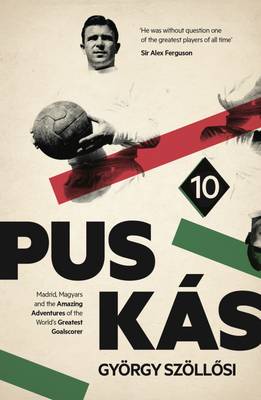 Puskás: Madrid, the Magyars and the Amazing Adventures of the World’s Greatest Goalscorer, György Szöllősi, foreword by Sir Alex Ferguson (Freight Books 2015)
Puskás: Madrid, the Magyars and the Amazing Adventures of the World’s Greatest Goalscorer, György Szöllősi, foreword by Sir Alex Ferguson (Freight Books 2015)
When an earthquake or large meteor strikes the earth or moon, it can ring like a bell for a long time, as shock waves bounce to and fro, slowly dying out. That can happen in culture too: some events are like earthquakes that shake a formerly stable landscape. Stravinsky’s Rite of Spring is one of those cultural earthquakes. There was a riot at its début in Paris in 1913.
Ferenc Puskás (1927-2006) (pronounced roughly FEHR-ents PUSH-kaash) was the orchestrator of another Slavic earthquake, forty years later and about 150 miles north-west, in London. Except that Puskás wasn’t Slavic and didn’t speak a Slavic language. Hungarians and their language aren’t Eastern European in any conventional sense. Instead, they invaded Eastern Europe and overturned a Slavic tradition. Puskás and his Magyar team-mates invaded and overturned another tradition when they beat England 3-6 at Wembley Stadium in November 1953.
How could that happen? As György Szöllősi says viâ his translators Andrew Clark and Matthew Watson-Broughton, it was generally accepted at the time that “England were invincible on their own turf” (“The Magical Magyars”, pg. 60). At the return match in Budapest in May 1954 Hungary did it again. Only more so: this time the score was 7-1. Tom Finney, himself one of the all-time greats, said that it was like “cart horses playing race-horses” (pg. 61). Puskás scored twice in both games and one of those goals, created by a pull-back that sent Billy Wright sliding off the pitch at Wembley, is one of the most famous of all time.
If his career had ended after he came off the pitch in Budapest, Puskás would have sealed his place in footballing history. And it did soon look as though his career might be over. Stalin died in 1953 and increasing unrest in Hungary led to full rebellion in 1956. Bullet-holes in the parliament buildings in Budapest still show what happened next: the rebellion was brutally crushed. Puskás was one of more than 200,000 Hungarians who went into exile.
He wasn’t able to return for decades and his fellow countrymen could only whisper about the remarkable feats he performed when he managed to find a new club. It was called Real Madrid and Puskás joined Alfredo Di Stéfano to become one of its greatest ever players: he scored seven goals in two European Cup Finals for the club. His first batch was four, in the 7-3 crushing of Eintracht Frankfurt in Glasgow in 1960. Then he scored a hat-trick against Benfica in 1962.
Unfortunately, Benfica scored five goals and no-one else scored for Real. Even the greats don’t always win, but that hat-trick proves that Puskás could do remarkable things even in defeat. His statistics are astonishing, reminiscent of Don Bradman’s in cricket: 511 goals in 533 Hungarian and Spanish top-flight games and 84 goals in 85 games for Hungary. The former Manchester United manager Alex Ferguson is one of those who are still awed by Puskás: Ferguson writes the foreword to this book and says he “dodged school” in 1953 to watch Hungary play England at Wembley. FIFA now have a Puskás award for goal of the year and there’s a photo of Cristiano Ronaldo holding up a red number 10 shirt bearing the name Puskás.
Ronaldo is another great, but his challenges off the pitch are remembering where he left the keys for his Lamborghini and deciding which ear to put his diamond stud in. Puskás lived through the Second World War, then saw a team-mate, Sándor Szűcs, hanged for trying to leave Hungary, then came under sentence of death himself when he went into exile after the Hungarian Uprising. He didn’t wear diamonds, he was a diamond in the Aranycsapat, the Golden Team that was the pride of Hungary before Puskás and team-mates like Zoltán Czibor and Sándor Kocsis became unpersons as traitors to the communist state.
This biography is short and easy to read, but it would have been improved by an index and contents page. Puskás’s career would have been improved by a World Cup winner’s medal and György Szöllősi describes why he didn’t get one. He also describes what Puskás’s real ancestry was and why he censored his birthdate. Hungary is an interesting country in lots of ways and it’s still making more of a mark in Europe than its size and population might lead you to expect. Puskás put his mark on European history in ninety minutes at Wembley in 1953, but he did much more than that and this book tells you how.

